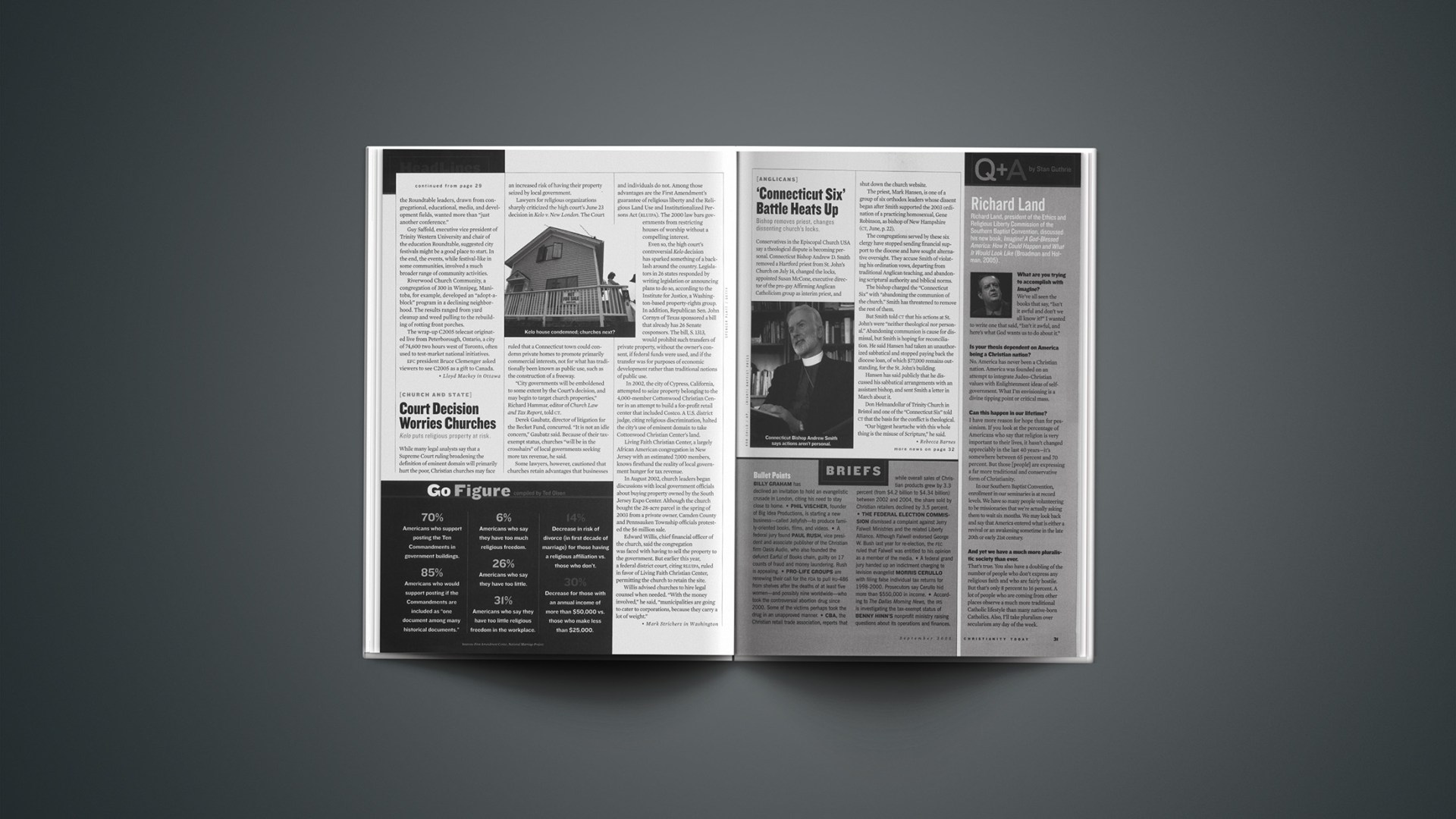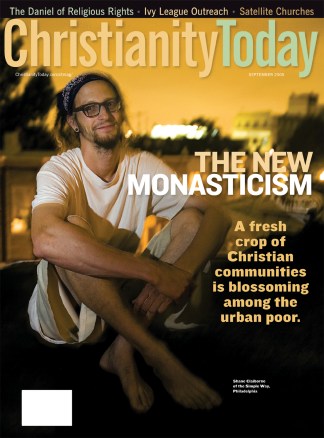While many legal analysts say that a Supreme Court ruling broadening the definition of eminent domain will primarily hurt the poor, Christian churches may face an increased risk of having their property seized by local government.
Lawyers for religious organizations sharply criticized the high court’s June 23 decision in Kelo v. New London. The Court ruled that a Connecticut town could condemn private homes to promote primarily commercial interests, not for what has traditionally been known as public use, such as the construction of a freeway.
“City governments will be emboldened to some extent by the Court’s decision, and may begin to target church properties,” Richard Hammar, editor of Church Law and Tax Report, told CT.
Derek Gaubatz, director of litigation for the Becket Fund, concurred. “It is not an idle concern,” Gaubatz said. Because of their tax-exempt status, churches “will be in the crosshairs” of local governments seeking more tax revenue, he said.
Some lawyers, however, cautioned that churches retain advantages that businesses and individuals do not. Among those advantages are the First Amendment’s guarantee of religious liberty and the Religious Land Use and Institutionalized Persons Act (RLUIPA). The 2000 law bars governments from restricting houses of worship without a compelling interest.
Even so, the high court’s controversial Kelo decision has sparked something of a backlash around the country. Legislators in 26 states responded by writing legislation or announcing plans to do so, according to the Institute for Justice, a Washington-based property-rights group. In addition, Republican Sen. John Cornyn of Texas sponsored a bill that already has 26 Senate cosponsors. The bill, S. 1313, would prohibit such transfers of private property, without the owner’s consent, if federal funds were used, and if the transfer was for purposes of economic development rather than traditional notions of public use.
In 2002, the city of Cypress, California, attempted to seize property belonging to the 4,000-member Cottonwood Christian Center in an attempt to build a for-profit retail center that included Costco. A U.S. district judge, citing religious discrimination, halted the city’s use of eminent domain to take Cottonwood Christian Center’s land.
Living Faith Christian Center, a largely African American congregation in New Jersey with an estimated 7,000 members, knows firsthand the reality of local government hunger for tax revenue.
In August 2002, church leaders began discussions with local government officials about buying property owned by the South Jersey Expo Center. Although the church bought the 28-acre parcel in the spring of 2003 from a private owner, Camden County and Pennsauken Township officials protested the $6 million sale.
Edward Willis, chief financial officer of the church, said the congregation was faced with having to sell the property to the government. But earlier this year, a federal district court, citing RLUIPA, ruled in favor of Living Faith Christian Center, permitting the church to retain the site.
Willis advised churches to hire legal counsel when needed. “With the money involved,” he said, “municipalities are going to cater to corporations, because they carry a lot of weight.”
Copyright © 2005 Christianity Today. Click for reprint information.
Related Elsewhere:
Charles Haynes of the First Amendment Center comments on Kelo saying, “Government officials are increasingly insensitive or even hostile to houses of worship, passing ordinances excluding them from various neighborhoods or restricting their ability to expand.”
Kelo v. City of New London is available from Findlaw.com.
CT’s coverage of the Cottonwood Christian Center/Costco dispute includes:
Weblog: ‘Costco Church’ Fight Finally Over? | Church and cities finally agree on plan (June 01, 2004)
Costco Denied | Judge rules that government can’t take church land and give it to a business. (Sept. 19, 2002)
Weblog: City Seizes Church Land to Build a Costco | California megachurch kicked off land by city seeking Costco’s tax revenue (May 30, 2002)
CT’s coverage of RLUIPA includes:
Court Affirms Rights of Inmates | Prison officials may not place “substantial burden” on religious exercise (February 2004)
Federal Judge Rules Parts of Church Land-Use Law Unconstitutional | Groups plan to help Elsinore Christian Center appeal zoning case. (July 11, 2003)
No Religion-Based Zoning | Illinois Vineyard church wins right to worship in its own building. (May 13, 2003)
Churches vs. Homeowners | Legal experts assess last week’s appeals court decision that houses of worship may be “incompatible with a place of quiet seclusion.” (Oct. 23, 2002)
Feds Intervene in Zoning Case | Elsinore Christian Center seeks to relocate into commercial zone. (Oct. 3 2001)
President Signs Religious-Liberty Bill | Law says government must again prove “compelling interest” to curb free exercise of religion in land use, prisons, and hospitals. (Sept. 26, 2000)










